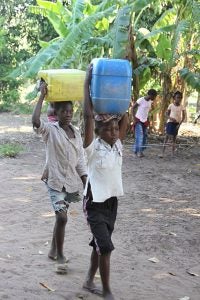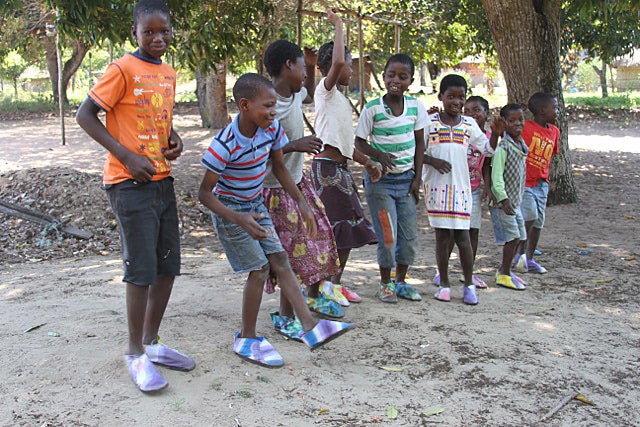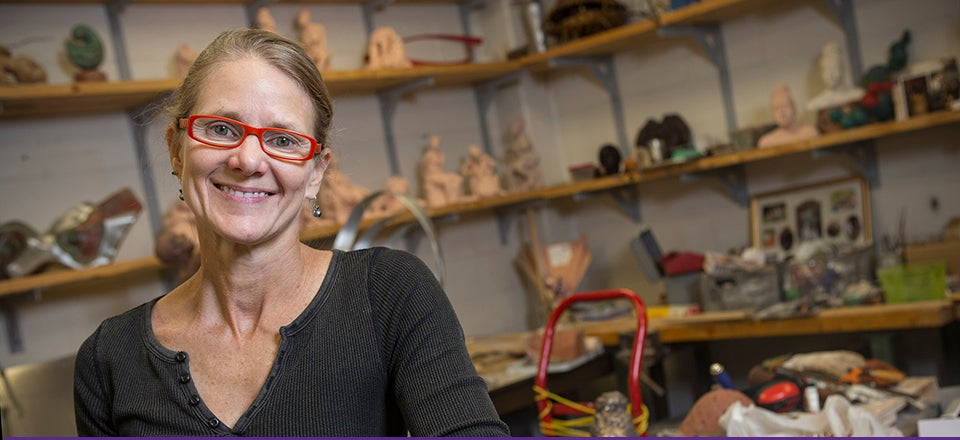‘A PERFECT FIT’
Brody graduate, now art student, helps teach mothers in Africa to make shoes for barefoot children
Chris Morgan’s lifelong interests in art and science converged in a tiny village in Africa this fall.
The East Carolina University alumna and art graduate student traveled to Mozambique as part of a contingent from Arts to End Genocide, an eastern North Carolina-based non-profit that started a program called Heeling Our World.
Through shoe-making, the effort aims to educate students in the United States about the physical and economic conditions of underserved children in Africa.
“Chris has been a key player in the inception and development of the program,” said Mitch Lewis, executive director of Arts to End Genocide. “As a physician and mother, Chris has great empathy and compassion for the plight of barefoot children.”

Children often walk long distances in their bare feet in Mozambique, making them at risk for infection and disease.
Diseases often enter children’s bodies through cuts in their feet. Jiggers, a parasitic sand flea, are common in the village. Once inside the skin, jiggers lay eggs and multiply. Children with jiggers are socially stigmatized, and worse, sometimes become paralyzed, lose limbs or die. A pair of shoes could prevent that outcome.
“Art is not always about beauty. Sometimes it’s about bringing attention to things that are ugly,” Morgan said.
“Walking a kilometer to a water source to have to pump just to get dirty water and bring it back in jugs on your head, you can imagine you can get infections and things in your feet,” Morgan said. “It doesn’t have to be jiggers; it can be anything. There is no medical care to speak of.”
Heeling Our World is helping parents and siblings in rural villages throughout Africa develop cottage industries for hand-sewing simple shoes with locally-sourced materials.
The shoes are made with a fold-and-stitch process. “You can’t make it too difficult,” Morgan said. “It’s just to cover feet. And they can make it again when they grow out of it.”
MORE THAN SHOES
Morgan was an obstetrician and gynecologist for 10 years in New Bern before a hand injury forced an early end to her medical career.
It was during this time she became involved with Heeling Our World.
“For me, it takes a medical need and addresses it with an arts-based advocacy program,” Morgan said. “Beyond that, it’s more than making shoes. It shows them that there are people on the other side of the world who care about them, and it empowers them by giving them a skill to pass on.”
She dedicated herself to helping others, particularly in rural and underserved areas, as a graduate of ECU’s Brody School of Medicine. “They instilled in me a desire to have some sort of outreach into communities that have been less fortunate,” Morgan said.
She had always wanted to go on a medical mission trip, but never had the opportunity with the demands of family and career. The Mozambique trip rekindled that interest. “It seemed like a perfect fit for me,” Morgan said.
She earned a bachelor’s degree in chemistry from UNC before entering medical school at ECU. Her interest in science and art goes back to childhood. Morgan studied classical ballet in New York City after high school and performed with the Joffrey Ballet, the New Jersey Classic Ballet, Bronx Opera Company and a Hollywood-based jazz troupe that toured Europe. Morgan, whose master’s concentration is in sculpture, has won awards from the ECU School of Art and Design and juried art shows in the area. She has pieces in permanent collections from North Carolina to Italy. She also is an accomplished potter, violinist and painter.
HELPING HANDS
Four hours from the capital of Maputo, residents live in thatched huts, have no electricity and cook outside. “You’re in the middle of nowhere but you see these people walking, and you think ‘where did they come from and where are they going?’ ” Morgan said.
She and Lewis rode in a four-wheel-drive vehicle down a clay road clogged with rubble and potholes. Their team included two translators, social workers and a health care worker.
Once in the village of Macuane, Morgan worked in a crowded hut, kneeling on a concrete floor, teaching mothers to make shoes for their children in temperatures that hovered near 107 degrees in October.
“It was a very small space but very energetic,” Morgan said. “Seeing the children wearing their shoes was just fantastic.”
“Despite the language barrier, she bonded with the children, who all adored her,” Lewis said. “Chris was always thinking ahead as to what else we could do to help the village.”
Not only are village residents making shoes, a local shoemaker and artist at a vocational training facility in Mozarte is helping sustain the effort too. There, Morgan learned the dip-dying process for the shoe fabric, which she hopes to incorporate into Heeling Our World’s educational awareness programs offered in North Carolina public schools.
The shoe line will be made and sold at a shop outside the village in areas where tourists from South Africa and Europe head for vacation along the Indian Ocean. Students at N.C. State University also have designed a line of fashion shoes which will be sold in local African marketplaces and online. Sales will support existing cottage industries and fund new ventures in African nations.
Locally, students in Pitt, Carteret and Craven counties have helped make shoes to send overseas.
The Heeling Our World project also plans to expand its mission to an orphanage in need in Uganda, where they hope to travel this year, Lewis said.
To donate, go to https://www.globalgiving.org/projects/http-making-shoes-for-barefoot-children-in-mozambique/. For more information, visit http://www.artstoendgenocide.org/mozambique.html.

Children show off their new, hand-made shoes in a village in Mozambique.
